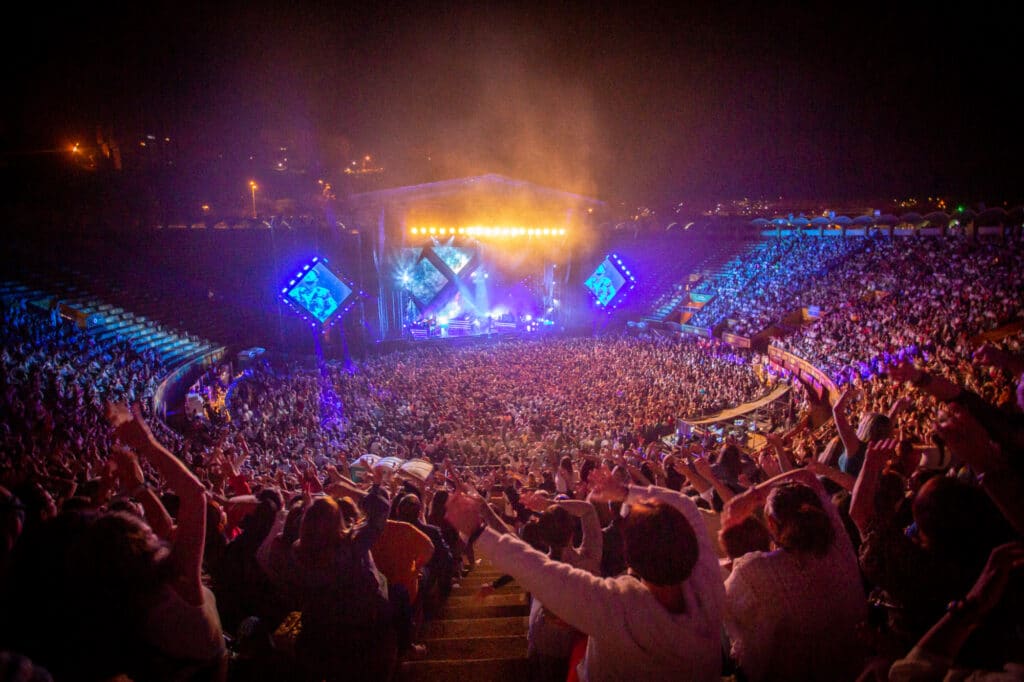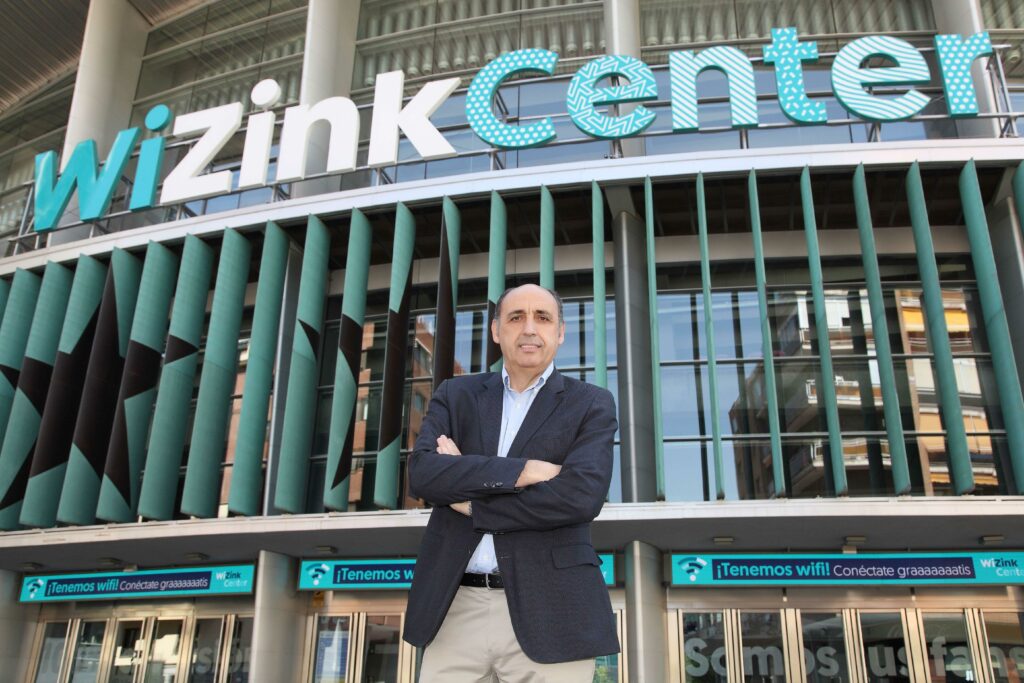Features
Spain Focus: Making The Most Of The Post-Pandemic Glut

Spain is made up of various autonomous regions which may differ in language and culture, but are united by their love for live music. The Spanish countryside offers stunning backdrops for outdoor events, which also benefit from a Mediterranean climate. Now that COVID restrictions have lifted and international travel is becoming easier, the country’s promoters and venue operators are ready to pick up where they left off in 2019.
Rosalía, Elton John, Guns N’ Roses, and Harry Styles are just a few of the major acts set to perform in Spain in 2022. Red Hot Chili Peppers are to launch their summer run of stadiums at Estadio La Cartuja in Seville – the same venue where Spanish superstar Manuel Carrasco will play to a sold-out crowd of 65,000 a few days later. The country’s flagship festival Primavera Sound boasts a massive lineup that includes Gorillaz, Tame Impala, The Strokes, Jorja Smith, Nick Cave, Lorde, Tyler, the Creator and many more.
It looks ideal on paper, but after months of restrictions the industry is now facing the challenge of finding the crews, venues, and audience to handle what is the biggest volume of shows – concerts, musicals, sports events – ever on sale. Combined with the backlog of 2020-21, the market is bulging at the seams.

Pino Sagliocco, chairman of Live Nation Spain, summed up the status quo: “Spain ranks in the top 10 of the world markets. The venues in the major cities of Madrid, Barcelona, and Bilbao, are amongst the best in Europe. The fact that there is a strong market for local artists, as well as for international tours, shows that there is major infrastructure supplying the industry. There are plenty of local promoters, and regional governments investing a lot of money in helping to organize city events, which further
supports the industry. However, the COVID pandemic has meant that a lot of [professionals] have been forced to leave the industry as there was no government support for them like there was in other countries. I believe we will see the effects of this clearly now that the industry is back in force.”

As one would expect, the country’s capital, Madrid, and the capital of the autonomous region of Catalonia, Barcelona, lead the country in terms of ticket sales. The autonomous communities of Andalusia, Valencia and the Basque country then followed. Robert Grima, president and head promoter at Live Nation Spain, explained, “Madrid and Barcelona are undoubtedly the most relevant cities in terms of live music offerings. But since a few years, and especially after these last two, Madrid has positioned itself as the priority market [thanks to its] geographical location and transportation hub connecting it to all Spanish regions.”
Manuel Saucedo, general manager of Madrid’s WiZink Center, confirmed, “Madrid is trending. It is reflected in the number of visitors Spain´s capital received before the pandemic, but also now, during the recovery. A lot of high-end hotels are under construction, and [government agencies] are taking this boom into account to promote leisure, gastro, sports, culture and musical tourism.”

Chen Castaño, managing director at Planet Events, added, “We have to bear in mind that Madrid is the city with the second-largest population in
the European Union. With almost 3.4 million people living in it, concerts are guaranteed visitors. However, there are plenty of other cities in Spain that work just as well for big tours, especially in the summer.”
Barcelona, for instance, has a long history of attracting tourists and concert audiences from all over Europe, who like to combine a trip to a city of cultural, architectural, and culinary wonders with the opportunity to see the world’s biggest acts at events like Primavera Sound. The festival takes place at the Parc del Forum, right on the beach – a venue managed by Carme Lanuza, who is also the director of the Palau Sant Jordi and Barcelona’s Olympic Stadium. The various venues under her care can host any number of people from 1,000 to 60,000, and Lanuza has seen numerous artists increase their Spanish fanbase and grow into superstars by touring the circuit. Ed Sheeran, for example, visited the Palau Sant Jordi in Barcelona for the first time in 2014 with an audience of 4,000, sold out 18,400 seats at the same building three years later, and sold out 55,000 seats at the Olympic Stadium in 2019.

“There is considerable musical savvy among people who have devoted themselves for decades to promoting and producing concerts, to learning and improving, to developing and sharing with us their commitments, initiatives and even readiness to take risks to make sure Barcelona remains this musical epicenter in our region,” Lanuza said.
The Ed Sheeran shows were promoted by Mercury Wheels, whose head promoter Barnaby Harrod said, “Bands often tell me that the Spain shows are always one of the highlights of their tour. Spain is home to world-class venues as well as a series of world-class festivals. And the food and weather make the Spain experience one to remember!”
That experience isn’t limited to Madrid and Barcelona. Juli Guiu Marquina, president of Clipper’s Music Group, one of the country’s leading independent promoters, said Spain’s cultural and musical offering was extending quickly to areas outside the main cities. Clipper’s is developing two new summer festivals in places such as Cambrils and La Cerdanya, and continues to run
Cap Roig Festival in the Costa Brava. “These are all places where people may go on vacation or have a second home, so the audience canbe wider and more varied, including not only local but also international fans,” he explained.

Another remote place that’s hosted blues legends like Solomon Burke, the late Johnny Winter, or Buddy Guy for the past 27 years is Cazorla. Riff Producciones, the company behind Bluescazorla festival, scheduled July 7-9 this year, has become one of the country’s leading promoters since launching the festival in 1994. Riff president Chris Ortiz and his team, like all the professionals Pollstar spoke to, did their best to keep business alive during 2020 and 2021, when Spain was facing some of the toughest COVID restrictions in Europe.
The live events sector got hit particularly hard. There was one point during the summer of 2020 when even families would be separated at a show and forced to sit apart at a mandated distance with their masks on, not allowed to get up unless they wanted to use the toilet. Naturally, many people didn’t bother buying concert tickets under such circumstances, and it took resilience to survive as a professional working in the live biz. “Promoters in general, we’ve always been hard-headed, don’t-take-no-for-an-answer people,” said Ortiz. “When we all had to reduce format, we reduced format. When we had to do it like this, [we did] it like this. Reserved seating? OK. We’ve been saying yes to everything, just trying to push forward. And that first summer wasn’t a good summer, and a difficult year, economically.”

Rosa Lagarrigue, CEO of long-standing Spanish management, promotion and label services company RLM, remembered, “We did many small shows during the pandemic, constantly adjusting to the COVID restrictions, and adapting to this whole new situation full of uncertainties. An artist like Andrés Suárez did 40 shows in 2020 with good average ticket sales.” RLM was also the promoter of two concerts by Raphael at WiZink Center Madrid around Christmas 2020, both at a capacity of 5,000, the first concerts in Europe to bring back large audiences indoors.
That first pandemic year required “effort, determination and the ability to constantly adapt,” according to Marquina. In 2021, Clipper’s Music Group
held the 21st edition of Cap Roig Festival with a total of 19 sold-out concerts and an audience of more than 36,000. “Also in 2021, we started Antonio Orozco’s ‘Aviónica Tour’ with an overwhelming success: a total of 53 concerts were held, of which 50 were sold out, [amounting to] more than 80,000 spectators,” Marquina recalled, describing the audience response throughout the pandemic as “impressive.”
The buildings have been making the most of the forced downtime to improve their facilities. WiZink Center has been refurbishing its VIP boxes and backstage facilities. Venue GM Saucedo revealed that a new 1,000-capacity concert hall to welcome all kinds of events, but especially emerging talent, was currently under development at the arena.

Palau Sant Jordi in Barcelona received “new emergency exits that enable us to expand audience capacity to 18,411, which makes it the largest-capacity indoor venue in Spain,” according to Lanuza, who also mentioned, “the remodeling of the press grandstands, the replacement of the complex’s outside lighting with LED technology, the comprehensive renovation of public toilets and other improvements relating to the building’s safety.”
Both buildings were at the forefront of Spain’s reopening efforts. Palau Sant Jordi hosted a 5,000-capacity pilot concert, on March 27, 2021, the result of a collaboration between scientists, promoters, institutions, and others, to determine the safety of large crowds gathering at indoor events. Lanuza said, “This would not have been possible without teamwork. That day was magical as it enabled us to show the world that the music industry was still alive and capable of doing everything to ensure the survival of live music. The image of the Palau Sant Jordi was splashed on the front of newspapers all over the world. That concert was no miracle, but rather the result of the cooperation of lots of people committed to achieving a common goal.”

Looking back, Chris Ortiz isn’t entirely sure that forcing shows through under such adverse circumstances was “the best idea.” The constant moving of goalposts, the shows that had to be postponed, sometimes due to local restrictions, sometimes because a band member or crew tested positive, took a toll. At least it kept the whole team busy and made sure Riff was prepared for a strong return in 2021, led by the farewell tour of Spanish songwriter icon José Luis Perales. When Perales went into rehearsals in early June that year, the country was still in lockdown, but outdoor venues opened back up
at full capacity right ahead of the tour’s opening night at Starlite Festival in Marbella on July 28, 2021. Ortiz and his team got lucky again, when buildings were allowed full capacities in September, just when Perales’ tour went indoors.
Sales in general really started picking up in September through December of last year. “That’s changed,” says Ortiz, “since the middle/end of February, ticket sales, with a few exceptions, have been slow across the board.”

There are various factors for that, he continued. The war in Ukraine has been dampening people’s spirits, and rising gas prices have made everyday life much more expensive. Many are thinking twice about spending money on concert tickets. Plus, says Ortiz, “We’re hitting our limit as to the number of shows [on sale]. Every weekend in July there’s big shows, major tours. I just came from back from a show we had in Murcia, and the city’s bull ring hosts close to 20 shows this summer. They never used to do more than five back in the day, I’m talking four or five years ago, not just pre-pandemic. But then it’s not just the bull ring; there’s six big festivals happening in the same city between now and October. There’s definitely an oversupply.”
Ortiz observed the steepest sales decline among Riff’s rock and blues customers, usually an incredibly loyal bunch. The fact that the young audiences are still buying concert tickets, according to Riff’s own sales data, suggests that health concerns play a big part in people’s purchasing decisions.
RLM booking director Yann Barbot Marín confirmed a drop in sales particularly among the older demographic. And while he believes that some of the adult population may be afraid to return to concerts, he mainly thinks that the live offer in 2022 is simply “too large.” Tours that had to be postponed since 2019 are now finally able to make good on their promise. So, while the overall volume of announced shows is impressive, it’s important to remember that many of those went on sale years ago.

Nicolas Renna, managing director of Proactiv Entertainment, said, “sales are definitely not what they used to be. Madrid outperforms the secondary cities. Concerts targeting young crowds sell well, while older crowds are slower at buying tickets. There is also an excess of offer, and tours that usually sell out do not sell out now. I think that people want to go to concerts, but they have to choose between too many options, and many still have rescheduled shows to attend.”
Marquina at Clipper’s hasn’t yet noticed any differences between demographics in terms of their willingness to return to shows. “After the pandemic,” he said, “the audience has shown a great desire to go back to concert halls and music festivals, to keep buying tickets to see their favorite artists and continue enjoying live music.”
In the eyes of Live Nation’s Robert Grima, the fact that fans held on to their tickets for so long was “evidence of loyalty from fans to their favorite artists.” He anticipates a “very enthusiastic reaction to the return of live music,” and perceives “a very clear interest on the big events, consolidated festivals, and big artists. Sales for those shows are amazing.
But we still need [to wait and see] until [we’ve caught up with] all shows that couldn’t be held in 2020 and 2021.”

Narcis Rebollo is the president of Universal Music Spain & Portugal, as well as of Global Talent Services. He said, “sales are definitely picking up and the industry will be fully recovered this year. The only risk we should bear in mind is that supply is exceeding demand in some cases due to the new tours that are being added to previously sold-out shows that were rescheduled this year due to the pandemic.”
What is more, Rebollo continued, “the sheer number of festivals in Spain, and the competition and rivalry among them that lead to unheard-of offers backed by their upscale sponsors, generate unrealistic price expectations for circuits and tours.” He praised this industry’s “ability to diversify, collaborate and come together,” during the tough years, but it remains to be seen if that collaborative approach will last now that restrictions on live are gone.
Ortiz at Riff is already observing artist fees rising, saying, “You have a lot of artists just taking advantage of the opportunity to sell shows and trying to get some of these fees that are being paid by festivals.”
The oversupply creates opportunities as well, for the operators of existing buildings, and developers of new ones. According to RLM CEO Lagarrigue, “depending on the city, we need more medium or large-capacity venues. And the circuit of small venues for developing artists is unfortunately still deficient.”
Ortiz sees room for a few concert-driven indoor arenas, particularly in Andalusia, which has plenty of gorgeous outdoor spaces, but not enough buildings. Any major tour not taking place in the summer months usually skips this region.

Live Nation’s Sagliocco agreed, “We need more venues at the arena level in some of the major cities such as Valencia and Sevilla.” WiZink’s Saucedo explained, “Venues dynamize the offer. This happens in Madrid, as well as in any other city. But it’s not just the existence of a venue. It is important that the venue´s management is proactive. Venues should be more than just landlords. They should search for new artists, book dates, be allies with the promoters, work side by side with the authorities to have the power to act in
the cultural activation strategies they set up.”
Proactiv’s Renna thinks even the main capitals like Madrid, Barcelona and Valencia would profit from more mid-size concert venues with capacities between 2,000 and 3,500. “Right now, the demand for spaces is too high due to
rescheduled tours, I don’t think it is sustainable at this level in the mid-term.”
Sagliocco is sure, that “the industry in Spain will continue to grow stronger than ever,” but adds, “the fact that we have had no work for two years in the COVID pandemic means that there is now an over-supply of bands and of festivals. I am worried that some of these, especially the smaller ones, will get hurt and may disappear completely.”